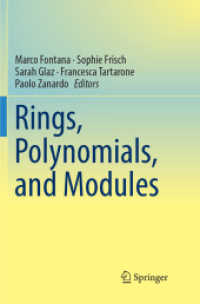Full Description
This is the first volume in the re-imagined series Research and Theory in Educational Administration. The volume includes a variety of perspectives written by university professors in the field of educational administration, which moves our thinking beyond the traditional scope of organizational theory and institutional analysis. It is this combination of theory, of new directions in leadership preparation and new narratives of participation that we hope will contribute to a more engaging volume for its readers—graduate students, researchers, and practitioners. The volume will provide evidence of and explanation for changing patterns of institution production explored through academic and epistemic drift. It also provides a deeper understanding of how state regulation is related to the school administrator pipeline or pathways. The concepts explained and illustrated in the volume hopes to provide a better framework for understanding how administrator preparation is unfolding across the U.S. and internationally, as well as the direction of the field of educational administration in the future.
Contents
Section I. Academic Drift and Institutional Production
Introduction to Volume; Arnold B. Danzig, William R. Black & Radha Aravamudhan.
Chapter 1. Who Is Offering University-Based Principal Preparation, To What Extent, and Where: A Focus on the Master's Degree and Why Change Matters; Frank Perrone.
Chapter 2. Principal Preparation or Leadership Education? Examining Administrative Licensure Production and Graduate Employment in Three State Contexts; William R. Black & Arnold B. Danzig.
Section II. Academic And Epistemic Drift: How State Policies And Values From Outside The Discipline Contribute To Internal Values And Norms.
Chapter 3. Preparing Teacher Evaluators in Complex Environments: The Influence of Policy on Academic Drift in Educational Leadership Preparation; Colleen E. Chesnut, Molly S. Stewart & Anna Sera.
Chapter 4. Who's in Charge? A State-level Analysis of Leadership Preparation; Bonnie C. Fusarelli, Lance Fusarelli, Lacey Seaton & Angela B. VanGorder.
Chapter 5. Examining the Tension Between Localized Bespoke Partnership Educator Administrator Preparation Programs and Centralized Administrator Credentialing; Valerie A. Storey.
Chapter 6. School Leader Production in Sweden and California: A Critical Analysis; Helene Årlestig & R.D. Nordgren.
Section III. Academic Drift And The Development Of Pathways For Curriculum.
Chapter 8. A Critical Examination of the Educational Leadership Standards: A Community Organizing Perspective; Anjalé D. Welton and Rhoda Freelon.
Chapter 9. The Unlocking Potential Program: Navigating Complexity and Co-constructing Leadership Preparation; Nicola Sum, Jeffrey S. Brooks, Jane Wilkinson, Mark Rickinson & Amanda Heffernan.
Chapter 10. A Narrative Stance: School Leadership Preparation Across International Settings; Jonathan Damiani & Douglas Wieczorek.
Chapter 11. Reforming the Design, Application, and Teaching of Quantitative Methods for Improving Practice and EdD Programs: A New Epistemology of Applied Quantitative Methods; Stanley Pogrow.
Section IV. Epistemic Drift: Uring And Shifting Norms Of Research And Preparation.
Chapter 12. Academic and Epistemic Drift and the Re-Production of Leadership Preparation Norms; Steve Myran & Ian Sutherland.
Chapter 13. Drifting from Equity: The Relationship Between Academic Drift, Epistemic Drift and the Role of Equity in Principal Preparation and Professional Development; Richard O. Welsh.
Chapter 14. Epistemic Drift: Theory-building and Research in Educational Leadership; Margaret Terry Orr & Casey D. Cobb.
Chapter 15. Who Controls the Preparation of Education Leaders? We Do, if We Commit to It; Michelle D. Young, Kathleen M. W. Cunningham & Andrea K. Rorrer.
Chapter 16. Afterword: Moral Drift; Truth and Tug of War, Gene V Glass.








